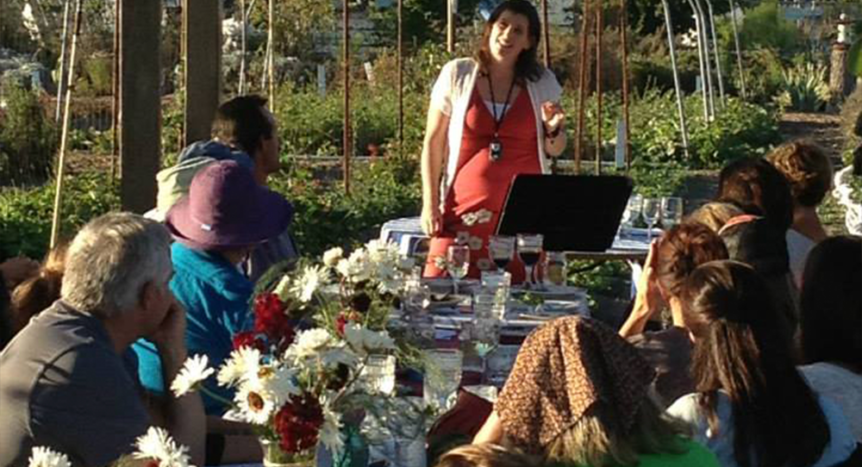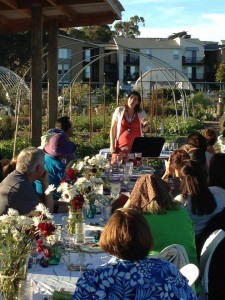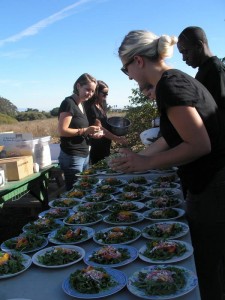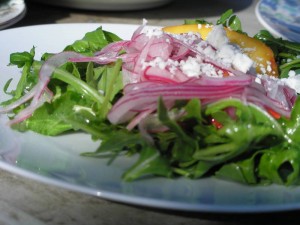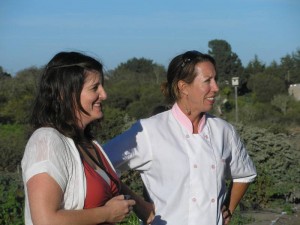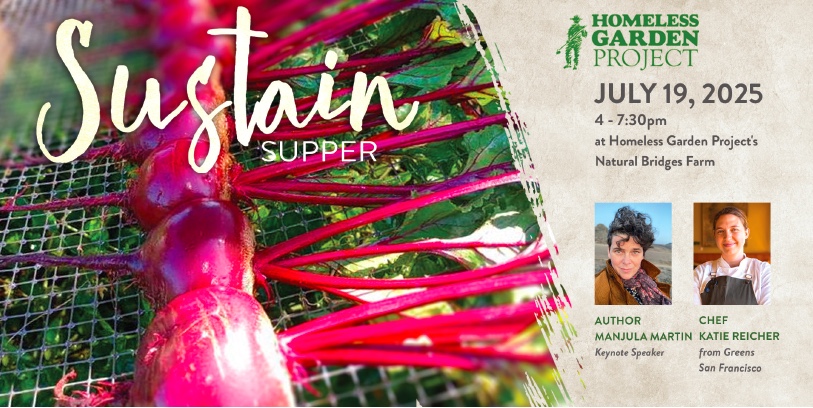When people ask me what is the best thing they can do to improve their diet, my answer is always the same: to cook at home more often. It isn’t to exclude sugar, wheat, gluten, or dairy, to eat more leafy greens… While all of those might be helpful, I think the best place to start is by getting to know your food and yourself a little better through cooking.
Watch and read Chef Jenny Brewer’s talk at our August Sustain Farm Dinner.
I wanted you to know that your meal was prepared with love and enthusiasm by two people who love food and cooking. This enthusiasm for cooking brings to mind something I saw on television not too long ago.
It was a commercial for Nestle Tollhouse Cookies. The commercial begins by showing an old fashioned kitchen with an apron clad grandmother, stirring a large bowl of made-from-scratch chocolate chip cookie dough surrounded by smiling children enjoying warm chocolate chip cookies. Fade out to the next part where a more modern looking woman is scooping chocolate chip cookies out of a plastic tub and putting them into the oven. The kids are still smiling. And the commercial concludes with the youngest of the three women taking her preformed cookie dough out of the plastic package and putting right in the oven. And everyone is still smiling.
Nestle wants you to believe this type of convenience is progress. But is it?
While on the outside this looks like a simple food commercial to sell chocolate chip cookies, the message they are sending is much more pervasive. Food companies know they will be more successful (in other words, you will be a bigger consumer for a longer period of time) if they can sell you the idea that you don’t have time to cook. Or that as a young person, you have more important things to do than cook. Or that cooking is an activity reserved for older people with lots of free time on their hands. Or that grandma is the only one enough time and skill to crack an egg or two.
And when you consider that the average person spends 27 minutes in the kitchen per day, down from an hour in the mid-60’s and that Americans spend less time cooking than people in any other nation, it appears their message is working.
This idea that in this day and age we are too busy too cook or that it isn’t important enough to devote time to, is perilous for many reasons. First, our health suffers. This decline in home cooking closely tracks the rise in obesity and all the chronic diseases related to diet. Convenience foods, or as Michael Pollan calls it, food-like substances, lack the nutrients our body needs for optimal health. Take a look at the difference in the two types of cookies from the commercial example. It is clear to see that if you are going to eat a cookie, you should go with grandma. This recipe is using real ingredients that are natural and pronouncable. When you cook at home, you can control the type and quality of the ingredients you use.
But this message that you are too busy or have more important things to do to cook isn’t just affecting our health. It is depriving us of the opportunity to really connect. First to connect to our food. When we get our food in neat and perfect packages, we are missing out on the opportunity of knowing where the food comes from. Seeing raw ingredients being transformed into a cooked meal reminds us of what food really is and that someone grew it—and that can give us a greater appreciation for it.
Speaking of appreciation, this meal you are enjoying tonight showcases the produce grown right here at the Homeless Garden. The padron peppers in your taco appetizer, the cucumbers filled with hummus, the lettuce in your salad, the squash that wrapped the fish, the basil in the pesto and the beautiful greens—all of it was grown right here where you are sitting. You too can have this beautiful produce at home by subscribing to the Homeless Garden Project’s CSA. There are two CSA’s available—One where You Pick the produce and one where they harvest and you Pick-up. Subscribing to a CSA is a wonderful way to deepen your connection to food, support your community and be inspired to cook a little more.
Cooking not only connects us to our food—it also connects us to each other. The rise in convenience foods has undermined the shared meal. If we are too busy to cook, then we are too busy to sit down and eat with each other. When you take the time to cook, chances are much more likely that people will actually sit and enjoy it.
In his book, the Blue Zones, author Dan Buettner looked at the cultures with the most people living to 100. They are Okinawa, Japan; Nicoya, Costa Rica; Sardinia, Italy; and Loma Linda, California. Not surprisingly, all four cultures shared similarities the author attributes to their longevity, one of which being strong social networks and family connections, very often strengthened over the shared meal.
When you sit down to share a meal like we are doing here tonight, you share more than just food. You share experiences of the day, ideas, opinions and emotions and you learn about each other.
The connection to food and our community starts with our connection to ourselves. And this is where I see cooking having the biggest benefit. I came to this conclusion through my own experiences with cooking. In an effort to heal my dysfunctional relationship with food—including years spent dieting and depriving myself, I decided to become a (what else?) nutritionist.
I studied nutrition for eight years, getting a bachelors and masters degree in nutrition and a certification from a well respected national institution. But the thing is, acquiring knowledge about food didn’t help my situation at all. While I had learned about food in my studies, I didn’t really know it. When I went to culinary school and learned to cook, it was as if I was learning about food and nutrition all over again. Except this time, I got it…
I’ve come to realize that knowledge and knowing are two different things. Knowledge is learning about something but knowing is really understanding it.
And to me, this is cooking’s ultimate gift: the ability to truly know our food. And since food is the nourishment for our bodies, isn’t it reasonable to think that this knowing can help us appreciate our body a little more?
When people ask me what is best thing they can do to improve their diet is, my answer is always the same: to cook at home more often. It isn’t to exclude sugar, wheat, gluten, or dairy, to eat more leafy greens or to eat small mini meals throughout the day, or to stop drinking caffeine or alcohol (heaven forbid). While all of those might be helpful, I think the best place to start is by getting to know your food and yourself a little better through cooking.
As a cooking instructor, I am thrilled to witness the transformation in my students when they attend cooking classes. For example, a student who was convinced she wasn’t creative enough to cook, preparing a delicious meal without a recipe, or a student who was able to learn how to be more efficient in the kitchen so she could stop relying on processed foods to get her through her long nursing shifts, or my 70 year old student looking to get reinspired to cook more healthy foods for her and her family in the golden years of her life.
By attending this benefit dinner to support the Homeless Garden Project, I know that you are someone who is committed to making a difference in your community. When you think about change, we often overlook how it starts at home.
As Michael Pollan writes in his book, Cooked,
Even to cook a few more nights a week than you already do, or to devote a Sunday to making a few meals for the week, or perhaps to try every now and again to make something you only ever expected to buy—even these modest acts will constitute a kind of vote. A vote for what, exactly? Well, in a world where so few of us are obliged to cook at all anymore, to choose to do so is to lodge a protest against the infiltration against commercial interests into every last cranny of our lives. To cook for the pleasure of it, to devote a portion of our leisure to it is to declare our independence from the corporations seeking to organize our every waking moment into yet another occasion for consumption. Cooking has the power to transform more than just plants and animals: It transforms us too…
So, as Michael Pollan suggests, if cooking is a Revolutionary Act, then I am asking you here tonight to be Revolutionaries by cooking more often. If you don’t cook at all, maybe it is simply substituting one meal a day with something real? After all, it doesn’t take any more time to put a sweet potato in the oven than it does a frozen pizza. Or, if you are cooking occasionally, try as Pollan suggests to cook one more night a week than you normally do.
Or how about giving yourself the gift of a few hours on a Saturday morning to make a delicious brunch with all of your favorites? (and if you are serving cinnamon rolls, I’d like an invitation) or to spend a few hours on Sunday evening making healthy food for the week. Or, for those who are already cooking quite a bit, take it up a notch and make something completely from scratch.
But I don’t want you to stop there—share it. Take a picture of your Sunday night creations and post it on social media. Tell your co-workers about how wonderful your Saturday morning cookfest was. Offer your neighbors a taste of the fresh peach pie you baked from scratch. Tell your family that you have started baking bread and how to work with sourdough starter. When we share our adventures in cooking with others, we are spreading the idea that we have the time to cook, and that it is important, and we are setting an example and inspiring others to follow.
And most important, our young people are watching and they will see that the key to real health and nourishment does not lie in the hands of the food corporations.
It is in the kitchen.
– Chef Jenny Brewer is a Nutritionist and Natural Foods Chef on a mission to change the way people look at healthy food. Through cooking classes, interactive workshops, and her online Healthy Meal Plan, she educates and inspires individuals to prepare healthy foods that taste amazing so it is easier to stay committed to their healthy lifestyles. Join her for her next Natural Foods Cooking Program, October 25-27th, 2013 in Santa Cruz, CA. You can find out more about it here: http://www.nourishingnutrition.com/natural-foods-training-program-2013/

